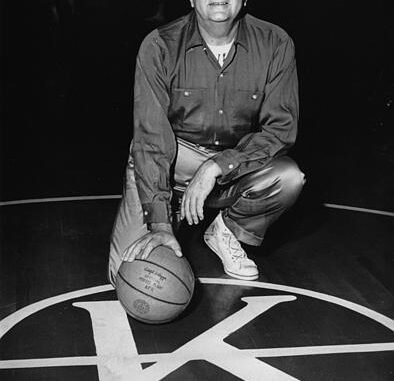
Adolph Rupp: The Baron of the Bluegrass and a Legend of College Basketball
Best known for his iconic tenure as the head coach of the University of Kentucky men’s basketball team — the Kentucky Wildcats — Rupp led the program from 1930 to 1972, transforming it into a national powerhouse and setting a standard of excellence that remains unmatched by many to this day.
During his extraordinary 41-year coaching career at Kentucky, Rupp compiled an astonishing 876 wins against just 190 losses, a winning percentage of .822 — one of the highest in NCAA history. Under his leadership, the Wildcats claimed four NCAA national championships in 1948, 1949, 1951, and 1958, and finished as national runners-up in 1966. Rupp also guided Kentucky to 27 Southeastern Conference (SEC) regular-season titles and 13 SEC tournament championships. His ability to consistently produce elite teams and groom exceptional players earned him the nickname “The Baron of the Bluegrass.”

Rupp’s coaching style was both rigorous and revolutionary. Known for his disciplined approach and strong emphasis on fundamentals, he developed a fast-break offense and a suffocating man-to-man defense that became hallmarks of Kentucky basketball. His meticulous attention to detail and insistence on precision in execution made his teams difficult to beat and set the tone for modern coaching techniques. Players under Rupp were drilled to perfection — mentally sharp, physically conditioned, and strategically aware.
One of the most defining moments of Rupp’s career came in 1948, when he coached the “Fabulous Five” — a group of standout players who not only won the NCAA title but also represented the United States in the London Olympics, bringing home the gold medal. That moment cemented Kentucky’s place on the international basketball stage and boosted the reputation of college basketball as a breeding ground for Olympic-level talent.

Despite his success, Rupp’s legacy is not without controversy. He has been criticized for the slow integration of African American players into Kentucky’s basketball program, especially during a time when racial equality in sports was becoming a pressing issue. The 1966 NCAA championship game, in which Kentucky lost to Texas Western — a team that started five Black players — became a pivotal moment in the history of college basketball and racial integration in sports. Though Rupp later recruited African American players, critics argue that his resistance to change reflected broader societal challenges of the era.
Nevertheless, Adolph Rupp’s impact on the game is undeniable. He was inducted into the Naismith Memorial Basketball Hall of Fame in 1969, a recognition of his strategic brilliance and long-standing contribution to the sport. Rupp Arena, the Wildcats’ home court since 1976, was named in his honor — a lasting tribute to a man whose legacy looms large in the annals of college basketball history.
In the end, Adolph Rupp was not just a coach — he was a builder of dynasties, a master tactician, and a pioneer in shaping the modern game. His name is synonymous with excellence, and his influence still echoes across basketball courts nationwide.
Leave a Reply